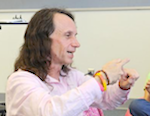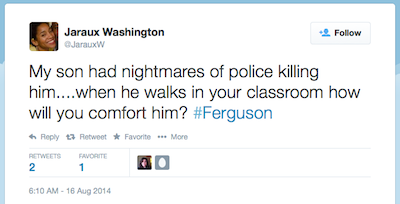As #Ferguson Fades from Our Twitter Feeds
 By Bill Ivey
By Bill Ivey
I stared at my Twitter feed last month, feeling utterly helpless as I read a tweet with the hashmark #Ferguson.
My son had nightmares of police killing him….when he walks in your classroom how will you comfort him?
That I would do something is unquestionable. The harder part is the what. It took me five minutes to type back:
I keep searching for the answer to that. Empathy and a hug only go so far. Think of concrete actions we can take to fight racism?
I believe that kids, perhaps even more so than adults, want to feel they have some degree of control over the world. While I can’t imagine what we can do to prevent another Ferguson ever happening (especially given that another depressingly similar shooting happened in Los Angeles just a few days later), we can certainly move the needle in the right direction. And including my friend’s child in coming up with ways to do so would hopefully help him feel more empowered.
My friend wrote back that we need “real conversations, need to stop avoiding or belittling the conversation so we can make real communities who value all members.” Implicit in this statement, of course, is the notion that there are in fact communities who don’t value all members.
Few are the communities who wouldn’t hold valuing all members as an ideal. But how many communities – ironically often in the name of maintaining unity – are all too willing to perpetually postpone certain conversations because they might be hard? The value of those conversations is obvious, or should be. But the path they open up can be scary to some of us. For one thing, the emotions can be so powerful.
Meanwhile, one of the friends of a Black expectant mother, who was reaching out for support as she envisioned the world her child would enter, shared a keynote by Glenn Singleton, “Courageous Conversations About Race,” at the 2013 School Improvement Network Innovation Summit. Singleton, the president of Pacific Educational Group, offers some background information not everyone may know and a protocol to frame these conversations.
The video, which takes about 22 minutes to watch, is an incredible resource for schools, other organizations, and people in general who recognize the necessity of addressing potential fears in enabling us to move forward.
We are the village
Even though #Ferguson is already fading from our feeds, the issues and social dynamics that led to it remain firmly in place. Moving forward is not an option but a necessity. Issues of race are marginalized far too often. We all like to think of ourselves as nice people trying to do the right thing, and for the most part we are. And that does matter.
But systemic racism in our country is bound to affect not just people of color but also white people; just as patriarchy affects not just women but also people of all genders (and sexualities); just as classism affects not just the impoverished but also people of all socioeconomic levels; just as ableism affects not just the disabled, and so on.
The many manifestations of privilege and oppression play out differently in different people, making each individual story matter deeply. So listening, learning, affirming, and acting are all important parts of the process.
My friend who asked about her son tweeted me back: thank you for the response. I appreciate it greatly. #village
It does indeed take a village. And that village is us.
Bill Ivey is Middle School Dean at all-girl Stoneleigh-Burnham School in Greenfield MA, where he also teaches Humanities 7, Social Media, and the Middle and Upper School Rock Bands. Bill is the advisor for MOCA, the middle school student government, and he coordinates and participates in the middle school service program. Bill’s other MiddleWeb posts include Hungering for a Better World, Actually, You ARE Special and Student-Driven Classrooms: Keeping the Faith.


































